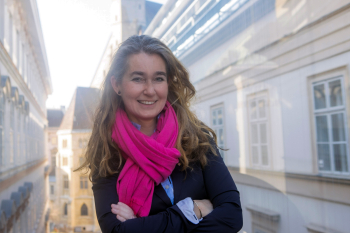Interview: Austria’s Foreign Ministry Recognises the Importance of Information Integrity
News details
Conversation with TED Network Working Group 3 Co-Chair , Ursula Werther-Pietsch
Interview by Frederik Caselitz
Ursula Werther-Pietsch is the Austrian representative and Co-Chair of TED Working Group on “Media and Digital” and has just extended her mandate for another year. We would like to cordially thank her and had a short conversation about the importance of information integrity for supporting democracy.
Dear Ursula, thank you for your commitment.
Why is the topic of media and digital so important when we talk about democratisation?
Thank you for extending my mandate. I am convinced that the ‘media and digital’ pillar is essential for democracy. The importance of information for democracy should be even more firmly anchored in international law, especially in view of the changing international framework in which media ecosystems operate (see UN Code of Conduct for Information Integrity, to be adopted at the upcoming Summit of the Future in New York). With the modernisation of our societies, information integrity is becoming increasingly important, especially for political decision-making. There is a new link here between information integrity, responsibility and the political life.
What are the key issues from the perspective of the EU and Austria?
The Foreign Ministry has recognised the changing importance of information. The relevance of information is considered in all political measures. We are developing a new sector policy on democratic governance, particularly in our dealings with third countries, i.e. developing countries. One of the four priority areas in this policy, besides the justice sector, greening of legislation, resilience and anticipatory governance,will be media education and digitalization for an open public space.
Such approaches can only be implemented if we coordinate global measures better. What added value do you see in the work of TED?
TED had a guiding impetus for Austrian policy development and ties in with a workstream that the OECD is also pursuing. A new and customised form of media support is being defined here. In this context, the Concordia Press Club in Austria published a call in February this year that formulates ten recommendations already reflecting the requirements of the new environment. Practical suggestions comprise developing sustainable fair business models and resiliency, supporting locally led, evidence-based, and demand-driven solutions journalism, strengthening legislation countering online harassment, spyware and mis/dis/malinformation (MDMs) at large, or combating media capture through transparency regarding ownership and data provenance and offering legal support and providing low-threshold legal advice (see https://concordia.at/uniting-for-democracy-appeal-feb-2024/).
What role can Working Group 3 play?
A number of pertinent activities are planned in this working group. The central aim is to visualise the approaches that have already been successful and to develop a forward-looking strategy for media support in a European spirit. Before the next Annual Meeting of TED, a draft will be produced to serve as a guide for all member states and civil society organisations. This draft is particularly important because it comes from the stakeholders themselves and not just from the states - a crucial point.

Log in with your EU Login account to post or comment on the platform.